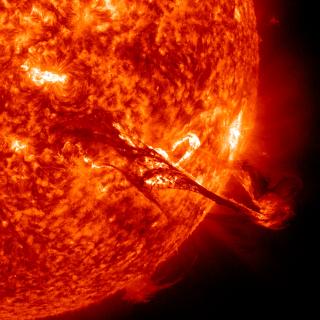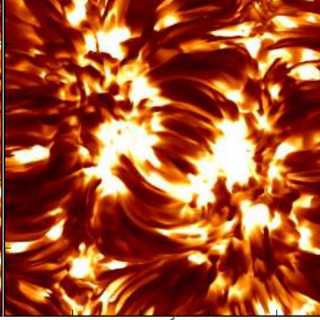Bibcode
Asensio Ramos, A.; Requerey, I. S.; Vitas, N.
Bibliographical reference
Astronomy and Astrophysics, Volume 604, id.A11, 9 pp.
Advertised on:
7
2017
Journal
Citations
57
Refereed citations
55
Description
Many phenomena taking place in the solar photosphere are controlled by
plasma motions. Although the line-of-sight component of the velocity can
be estimated using the Doppler effect, we do not have direct
spectroscopic access to the components that are perpendicular to the
line of sight. These components are typically estimated using methods
based on local correlation tracking. We have designed DeepVel, an
end-to-end deep neural network that produces an estimation of the
velocity at every single pixel, every time step, and at three different
heights in the atmosphere from just two consecutive continuum images. We
confront DeepVel with local correlation tracking, pointing out that they
give very similar results in the time and spatially averaged cases. We
use the network to study the evolution in height of the horizontal
velocity field in fragmenting granules, supporting the buoyancy-braking
mechanism for the formation of integranular lanes in these granules. We
also show that DeepVel can capture very small vortices, so that we can
potentially expand the scaling cascade of vortices to very small sizes
and durations.
The movie attached to Fig. 3 is available at http://www.aanda.org
Related projects

Solar and Stellar Magnetism
Magnetic fields are at the base of star formation and stellar structure and evolution. When stars are born, magnetic fields brake the rotation during the collapse of the mollecular cloud. In the end of the life of a star, magnetic fields can play a key role in the form of the strong winds that lead to the last stages of stellar evolution. During
Tobías
Felipe García

Magnetism, Polarization and Radiative Transfer in Astrophysics
Magnetic fields pervade all astrophysical plasmas and govern most of the variability in the Universe at intermediate time scales. They are present in stars across the whole Hertzsprung-Russell diagram, in galaxies, and even perhaps in the intergalactic medium. Polarized light provides the most reliable source of information at our disposal for the
Tanausú del
Pino Alemán